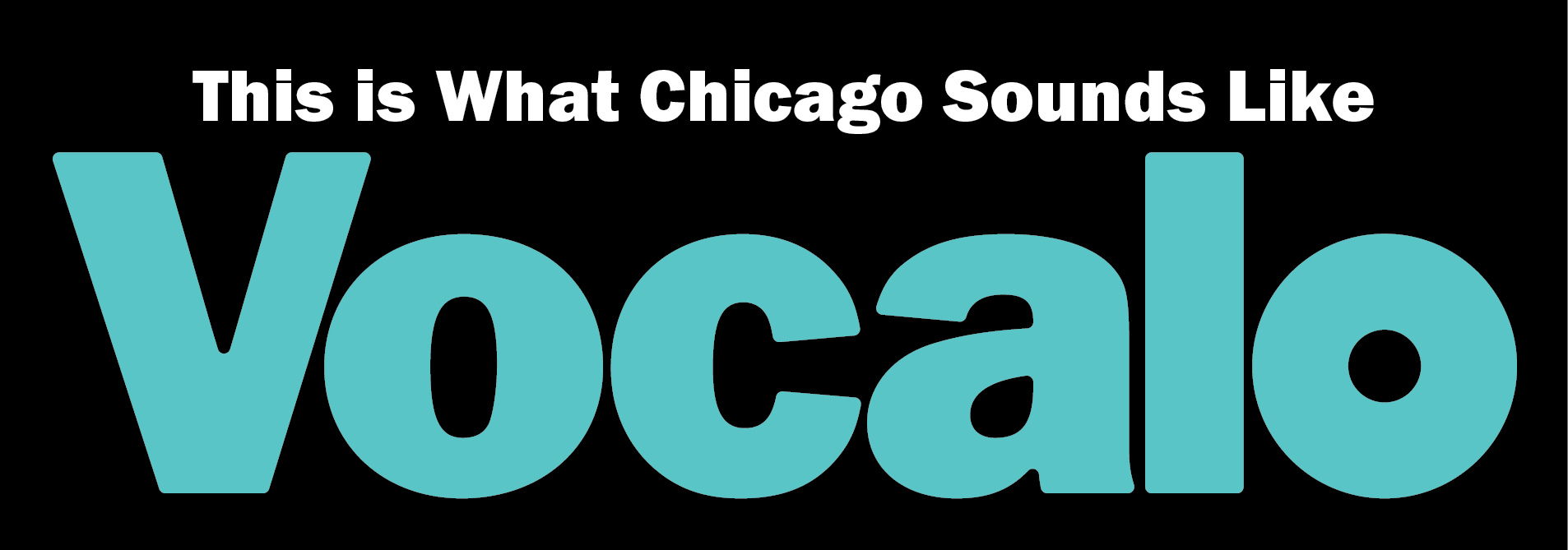Through Chicago Votes, Stevie Valles Works To Amplify Chicago Voices
Written by Vocalo Radio on June 15, 2023
Co-executive director of Chicago Votes Stevie Valles hopes to boost political representation for underrepresented Chicagoans.
Stevie Valles is a key figure in Chicago Votes, a non-partisan, non-profit organization dedicated to cultivating a more inclusive political landscape. Their mission involves empowering Chicago’s youth and the incarcerated by equipping them with the knowledge and understanding of their capacity for enacting political change. They strive to nurture aspiring leaders in Chicago’s political realm, and actively work toward enhancing voter participation across the city.
“We work to really just empower young Black and brown people with the knowledge they need to understand how politics work,” Valles said. “We try to provide them with opportunities to develop as leaders in the political space, and we provide those opportunities through running voter turnout efforts.”

Originally from Cincinnati, Ohio, Valles has been in Chicago since 2015 and acknowledges the profound impact of the city in shaping his identity: fostering strength and nurturing self-awareness.
“Chicago is not for the faint of heart,” he said. “It has made me a strong person, and I’m thankful for that … Strong in that I know when I’m weak, strong in that I know when I’m insecure, I know when I’m struggling, I know when I’m sad. I know when I do things that are not from a good place.”
For this segment of “This Is What Chicago Sounds Like,” Stevie Valles discusses his work with Chicago Votes and their mission to empower young Black and brown people with political knowledge.
What does Chicago Votes do?
We work to really just empower young Black and brown people with the knowledge they need to understand how politics work. We try to provide them with opportunities to develop as leaders in the political space, and we provide those opportunities through running voter turnout efforts. There is opportunity to have your voice heard in our political system, and that voice actually has significant influence over the decisions that leaders make. It’s really dope. It’s a creative organization, and we’re doing some real stuff.
What brought you to Chicago?
I came to Chicago for work. I remember the first thing I was struck with was how smoggy, humid it was. I was like, “Oh.” My apartment didn’t have any AC, and I didn’t think that was gonna be a big deal, because Chicago, you always think of it as being cold. But it was wet and hot. It was rough.

What neighborhood are you in now?
I live in the South Loop. The South Loop is where people who are not from Chicago move to, and so I’m guilty as charged. Part of the main reason I moved to Chicago is because I love big cities, the big city feel. I bike everywhere, or rollerblade. And it’s a pretty diverse neighborhood, a lot of Black-owned businesses around here, Black-owned restaurants, Black-owned bars, Black-owned coffee shops, clothing stores. I got a little community here, too, which is cool.
How did you get into this work?
I came from a politically-minded family. My mom was a stereotypical Black mom of the ’90s. A lot of Kente cloth. My grandma was a seamstress from the south. I was raised in a very Black feminist political lens, naturally, and my dad is a minister in a Black church. He has always kind of been an out-front spokesperson for, whether it be religion or movement work. And so I was kind of always raised with a sense of politics from a perspective of being a Black person in the United States, and my politics are built on that identity.
I went to an HBCU, in Huntsville, Alabama, called Oakwood University. My senior year, I was taking a policy course; really, for the first time, started connecting just bureaucratic government policy. And the role it plays in the lives of people who are struggling the most. I still didn’t know what I wanted to do. I was applying to jobs everywhere. I was just trying to figure it out. And I got an opportunity to do an internship in Washington, DC. I left DC for a little bit and organized on the Obama campaign in 2012, then came back to DC, then left DC again and started organizing on an affordable housing campaign in Austin, Texas. After that campaign ended, I started working for a woman who was running for governor of Texas. After that ended, I worked in the Texas legislature. And then I started running the national voter registration, and that’s when I moved to Chicago. And so about two years into that role, the opportunity to become the ED of Chicago Votes opened itself up. I applied, I got hired, and I’ve been the executive director at Chicago Votes since.
Participating does make sense, because it does have an impact. I understand why people don’t have faith in our political system. And that’s mainly because it’s overly bureaucratic. Making change through politics is long-term, consistent work. I’m of the belief that civics should be taught in tandem with math and reading and English, all these basic things that you need to understand in order to function in society. Civics should also be taught at that consistent of a rate at an early age, because our political system is so complicated and bureaucratic. Voting is a form of civic participation. Also, picking up the trash as you’re walking down the block, and throwing it away, is a form of civic participation. Holding the door open for people is a form of civic participation, saying hi to people, “How are you?” Just being nice is a form of civic participation. It’s how we, as citizens, contribute to the society that we all share, that civic participation, from my lens.

Can you tell us about a time you experienced the organizing in action creating change?
We turned the Cook County Jail into a polling location. And the way we did that is crazy. We were doing voter registration, we were like, “These folks need to vote.” We asked the board of elections if they would put a polling location there. They were like, “That’s illegal … In order to do that, you have to change state law.” So we worked for four years to change state law. We changed the state law, and in the last three election cycles, starting in 2020, the jail was a polling location. And it’s the highest voting precinct in the city … more people vote at the jail than any other voting precinct in the city. The voter turnout in the jail went from less than 7% to over 40%. And so now, this is literally a constituency. So if you’re running for office, you have to know what’s going on with people in jail, which is not something most people running for office have to pay attention to. And that’s the purpose of jails, that’s one of the purposes of jails, that’s one of the purposes of prison … You don’t want to deal with the systemic issues that are leading to so many people being locked up, so you’re just locking a bunch of people up and turning a blind eye to it. And the decisions that have led to that system are political decisions.
Those systems exist and continue to persist because the politicians who have a direct role in creating them don’t have to listen to the people suffering in them, don’t have to listen to the people locked up, because they don’t have the right to vote, or it’s hard for them to vote. That’s not the case now in the jail, in at least this jail in Chicago. There’s tons of jails across the entire United States. Most people in prison everywhere in the United States still can’t vote, which is a uniquely United States issue. And it’s a uniquely United States problem, because we lock up 25% of the world’s prison population. And most of those people are Black, most of them are brown, but if they’re not Black or brown, they’re definitely poor.
Why is this the case? Let’s figure that out, let’s figure out why we’re locking up so many Black, brown, poor people. Let’s also try to change the conditions that people have to exist in when they’re locked up. Let’s actually decide if locking people up makes sense, because our communities aren’t getting safer, crimes aren’t getting solved. All of that systemic undoing of our American legal system starts with making sure that people in that system have a chance to cast a ballot.

How has Chicago influenced your life, your work, who you are?
I was just thinking last night about who I am, as a person in this present moment, and how the two most impactful things that have shaped me into the human that I exist as today. One is Chicago, and the other is leaving the United States, traveling overseas. Chicago gave me the confidence to travel overseas. Chicago has made me a strong person, because you can’t hide from nothing in Chicago, the worst of the worst. And you also see the exact opposite, you see some of the most beautiful creative minds that you’ll ever see. And the other thing about Chicago is, you can’t fake nothing. Who you are comes through, period. So you’d better be confident in who you are, identify who you are, and refine who you are, or you’re gonna get shut. Chicago is not for the faint of heart. It has made me a strong person, and I’m thankful for that. Strong in that I know when I’m weak, strong in that I know when I’m insecure, I know when I’m struggling, I know when I’m sad. I know when I do things that are not from a good place. I know that. I’m self-aware, because Chicago.
Since 2016, we have been profiling people who give their all to Chicago and enrich us socially and culturally by virtue of their artistry, social justice work and community-building. Take a listen. Read their words. Become inspired.

Interview and audio production by Ari Mejia
Introduction written by Omi Salisbury
Transcription and editing for length and clarity by Morgan Ciocca
Photography by Ari Mejia, edited by Omi Salisbury
More from Vocalo:
 Vocalo Radio
Vocalo Radio 











